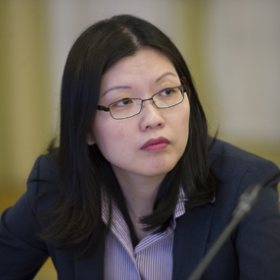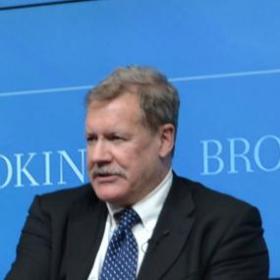
Fallout from the Hu-Obama Summit
EWI Associate Piin-Fen Kok, Vice President Greg Austin and Board Member Kanwal Sibal discuss the significance of the Hu-Obama summit in Washington, both for China-U.S. relations and China’s Asian neighbors.
In New Europe, Greg Austin maintains that the most interesting theme to emerge from the summit is that China’s power is constrained both by the international system and by its need to work creatively with partners to address common challenges.
Click here to read Austin’s piece in New Europe
Writing for India Today, EWI Board Member Kanwal Sibal examines the shifting balance of power between the United States and China, arguing that “the U.S. is mainly responsible for China’s accelerated rise.”
Click here to read Sibal’s piece in India Today
Between Two Reefs
Despite calming messages from the Hu-Obama Summit,
China’s Asian neighbors are still nervous
By Piin-Fen Kok
The recently concluded U.S.-China summit was important in resetting the tone of a bilateral relationship that has been fractious over the past twelve months. The modest expectations for Chinese President Hu Jintao’s visit to the United States —the first state visit here by a Chinese leader in thirteen years—were met in a number of positive ways that, on paper at least, bode well for strategic trust-building efforts between the two countries. Both sides reaffirmed their desire to focus on common interests while recognizing their differences; the United States accorded China the respect it sought as a major power; there was concrete progress on the trade and economic front, including $45 billion in trade deals and China’s agreement to delink its controversial indigenous innovation policy from government procurement processes; and, finally, there was a serious effort to address tensions on the Korean Peninsula.
Given the importance of the United States and China in regional and global affairs, the summit certainly has implications beyond the bilateral relationship. No region is more affected by its outcomes—and indeed, the ups and downs of the U.S.-China relationship more generally—than the Asia-Pacific. Consider the concerns over North Korea, the critical role of Taiwan in U.S.-China relations, and how intertwined the U.S. and Chinese economies are with other Asian economies. But another key reason is that over the last year, the level of strategic mistrust between the two giants has been exacerbated by U.S. re-engagement with Asia amid rising tensions between China and its neighbors.
In the lead-up to the summit, several Asian countries had hoped the United States would take a tougher stance toward China. They have become jittery about China’s increasing assertiveness, especially with regard to maritime disputes, access to economic resources, and the conduct of its military. At a White House briefing days before the arrival of President Hu, U.S. National Security Advisor Thomas Donilon gave the reassurance that the United States would protect the security interests of its Asian allies while developing relations with China.
Indeed, President Obama and other U.S. officials sent a clear message that they would stand firm against an aggressive Chinese foreign policy. They also pressed Hu and the Chinese side on a range of other issues, including human rights, trade and currency practices, and North Korea.
For all the efforts to convey a calming message, both sides appeared to be well aware of the potential for the Asia-Pacific region to become a source of heightened strategic friction between a highly confident China and a newly re-engaged United States. The Joint Statement issued after the Obama-Hu meeting on January 19 contained more prominent and frequent references to U.S.-China cooperation to promote peace, stability and prosperity in the Asia-Pacific region than did the November 17, 2009 Joint Statement, issued during President Obama’s visit to China. The latest Joint Statement also recognized the United States as “an Asia-Pacific nation” that was integral to the region’s development and stability. And in his speech to the business and NGO community in Washington, D.C. on January 20, Hu called for the two countries to strengthen cooperation in the Asia-Pacific—where, he said, they had the most overlapping interests.
While this cautious recalibration of relations between the United States and China has been generally welcomed by the two countries’ neighbors, some Asian nations remain wary about how the continuing battle for influence by these two great powers will affect the region. A Jakarta Post editorial commented: “The visit may not end with the two leaders resolving their differences, but it will certainly set the tone in the relationship between the global powers. The rest of the world will have to make adjustments accordingly. We are now moving away from a unipolar world back to a bipolar world, requiring Indonesia once again to row between two reefs as in the old Cold War days.”
There may be some validity in that statement. After all, Hu’s assurances in Washington of China’s peaceful intentions will not eradicate lingering U.S. or Asian suspicions, especially about its military capabilities. The People’s Liberation Army’s testing of a stealth fighter jet during U.S. Defense Secretary Robert Gates’ visit to China last month raised eyebrows not only in the United States, but also elsewhere in Asia. Some Taiwanese analysts argued that this latest development provided justification for U.S. sales of more advanced jets to Taiwan. The reports that President Hu had been caught by surprise by the test flight have raised more questions about whether China’s civilian leadership has control over its military, particularly at a time of political transition. And even while Hu was in Washington, Japanese Prime Minister Naoto Kan repeated concerns about China’s defense build-up and maritime activities and sought to emphasize the Japan-U.S. security alliance.
The bottom line is that the U.S.-China strategic relationship will continue to be tested in the region, despite the soothing tone of joint statements and other pronouncements of peace and cooperation. How both countries respond will speak to the sincerity of those pronouncements.


